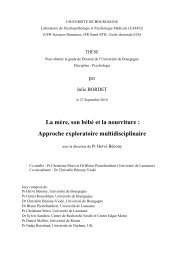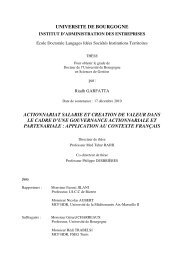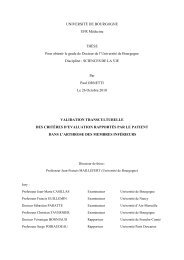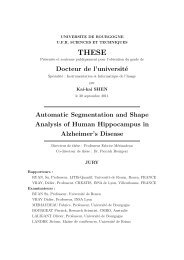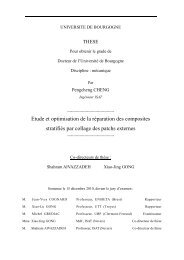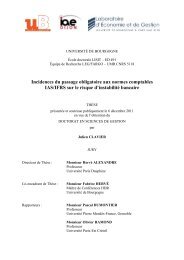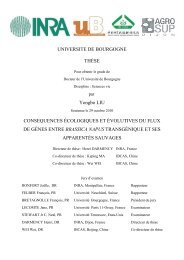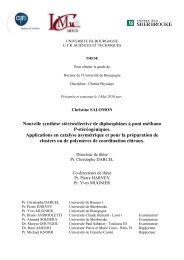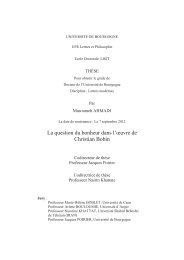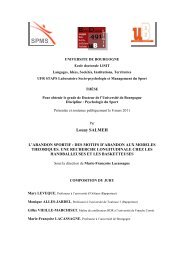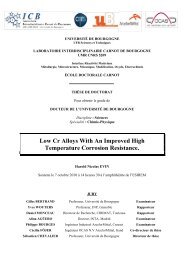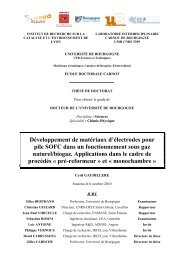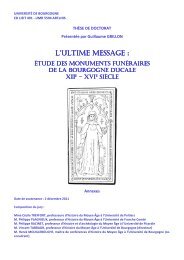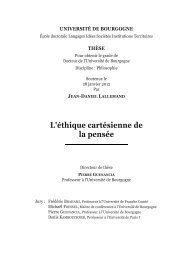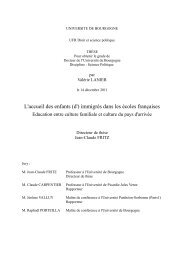Higher education in Asian countries and the role of international ...
Higher education in Asian countries and the role of international ...
Higher education in Asian countries and the role of international ...
Create successful ePaper yourself
Turn your PDF publications into a flip-book with our unique Google optimized e-Paper software.
3.6 Def<strong>in</strong>ition <strong>of</strong> higher <strong>education</strong><br />
56<br />
There exist different <strong>education</strong> systems <strong>in</strong> <strong>the</strong> world <strong>and</strong> usually <strong>in</strong> every system <strong>the</strong> total<br />
duration <strong>of</strong> formal school<strong>in</strong>g can be divided <strong>in</strong>to three broader levels; primary, secondary <strong>and</strong><br />
tertiary or higher but <strong>the</strong> duration <strong>of</strong> each level is not necessarily <strong>the</strong> same <strong>in</strong> all systems. In<br />
Armenia, Russia, <strong>and</strong> Turkmenistan primary school<strong>in</strong>g duration is only three years while <strong>in</strong><br />
Irel<strong>and</strong> it is eight years. Similarly <strong>the</strong>re exists a great variation <strong>in</strong> <strong>the</strong> duration <strong>of</strong> school<strong>in</strong>g at<br />
lower secondary level: <strong>the</strong> duration ranges from four years to n<strong>in</strong>e years <strong>in</strong> different <strong>countries</strong> <strong>of</strong><br />
<strong>the</strong> world. At tertiary <strong>and</strong> higher <strong>education</strong> level also <strong>the</strong>re exist great variation <strong>in</strong> terms <strong>of</strong><br />
duration <strong>and</strong> nature <strong>of</strong> <strong>education</strong>, which has made def<strong>in</strong><strong>in</strong>g higher or tertiary <strong>education</strong> more<br />
complicated. Any <strong>education</strong> entered after successful completion <strong>of</strong> secondary <strong>education</strong>, which<br />
may <strong>in</strong>clude vocational post-secondary <strong>education</strong> (lead<strong>in</strong>g to a certificate) <strong>and</strong> higher <strong>education</strong><br />
(lead<strong>in</strong>g to a degree), even though <strong>the</strong> designation is <strong>of</strong>ten used synonymously with higher<br />
<strong>education</strong> (Campbell & Rozsnyai, 2002)<br />
Accord<strong>in</strong>g to <strong>the</strong> American Heritage Dictionary, “higher <strong>education</strong> is a level that comes afar <strong>the</strong><br />
secondary level, particularly <strong>the</strong> <strong>education</strong> at college or university level” (The American<br />
Heritage Dictionary, 2009). Where Britannica Concise Encyclopedia def<strong>in</strong>es it as, “<strong>Higher</strong><br />
<strong>education</strong> or post-secondary <strong>education</strong> refers to a level <strong>of</strong> <strong>education</strong> that is provided at<br />
academies, universities, colleges, sem<strong>in</strong>aries, <strong>in</strong>stitutes <strong>of</strong> technology, <strong>and</strong> certa<strong>in</strong> o<strong>the</strong>r<br />
collegiate-level <strong>in</strong>stitutions, such as vocational schools, trade schools, <strong>and</strong> career colleges, that<br />
award academic degrees or pr<strong>of</strong>essional certifications” (The Encyclopædia Britannica, 2011).<br />
<strong>Higher</strong> <strong>education</strong> <strong>in</strong> <strong>the</strong> Encyclopedia Britannica has def<strong>in</strong>ed as “any <strong>of</strong> various types <strong>of</strong><br />
<strong>education</strong> given <strong>in</strong> postsecondary <strong>in</strong>stitutions <strong>of</strong> learn<strong>in</strong>g <strong>and</strong> usually at <strong>the</strong> end <strong>of</strong> a course <strong>of</strong><br />
study degree, diploma, or certificate are conferred. These higher-<strong>education</strong> <strong>in</strong>stitutions <strong>in</strong>clude<br />
universities, colleges <strong>and</strong> various pr<strong>of</strong>essional schools that provide preparation <strong>in</strong> such fields as<br />
law, <strong>the</strong>ology, medic<strong>in</strong>e, bus<strong>in</strong>ess, music, <strong>and</strong> art. <strong>Higher</strong> <strong>education</strong> also <strong>in</strong>cludes teacher-<br />
tra<strong>in</strong><strong>in</strong>g schools, junior colleges, <strong>and</strong> <strong>in</strong>stitutes <strong>of</strong> technology.” (The Encyclopædia Britannica,<br />
2011) Accord<strong>in</strong>g to this Encyclopedia “mostly higher <strong>education</strong> starts after <strong>the</strong> completion <strong>of</strong><br />
secondary <strong>education</strong>, <strong>and</strong> <strong>the</strong> usual entrance age is about 18 years.”<br />
Tertiary <strong>education</strong> is formal, non-compulsory, <strong>education</strong> that follows secondary <strong>education</strong>.<br />
Tertiary <strong>education</strong>, <strong>in</strong> most sett<strong>in</strong>gs, is non-compulsory <strong>education</strong> provided via a specialist



